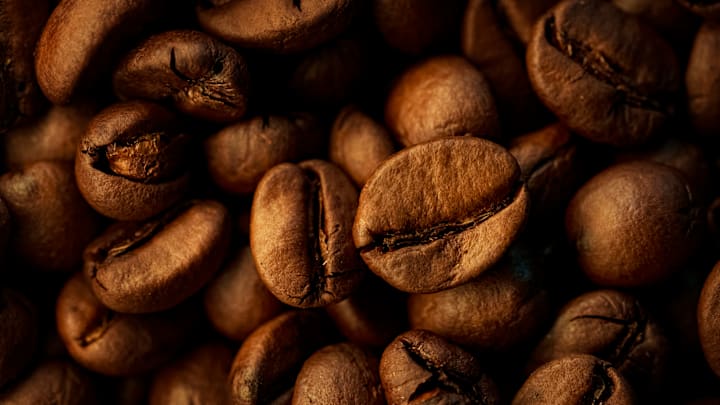Each day, millions of people brew a cup of coffee in the morning to help get their day started. As with most things in history, from milk to vegetables, someone had to be the first to think of roasting beans for their caffeine kick. According to legend, it was a 9th-century Ethiopian goat-herder named Kaldi who may have done as much for the beverage as Starbucks.
Allegedly, Kaldi observed his goats behaving erratically after eating the red berries from a nearby Coffea arabica tree. He tried some of them himself and was soon acting as hyper as his herd. He then brought a batch to a monastery, where their stimulating effects during long hours of prayer were cause for concern. Coffee, the men observed, must be the devil’s work.
The religious leaders there threw the tree’s beans onto a fire to destroy them—but the pleasing aroma that resulted convinced them to give coffee a second chance. Much like with tea, they put the roasted beans into warm water and coffee (the beverage) was born.
Despite the legend, it’s thought that the practice of chewing coffee beans as a stimulant was around for centuries before Kaldi's alleged discovery. People would grind them to mix with butter and animal fat to preserve and eat on long journeys—basically, a precursor to the energy bar. Similarly, enslaved Sudanese peoples are thought to have chewed on coffee beans to help them survive their difficult voyages on trade routes.
The story of Kaldi is difficult to pin down. What we do know is that true historical accounts of coffee consumption didn't materialize until much later, when devout Sufi in Yemen were said to use the drink to remain vigilant during religious rituals.
The cultivation and trade of the beans for the drink began in Arabic countries in the 14th century and spread throughout Egypt, Syria, and Turkey. It’s said not a single coffee plant existed outside of Arabia or Africa until the 1600s, when a pilgrim named Baba Budan brought them back to India. In 1616, Pieter van der Broeck smuggled some coffee out of Mocha, Yemen, and brought it back to Amsterdam. Soon, the Dutch and their colonies—most notably Sri Lanka and Java—took over the European trade, followed by the French in the Caribbean, the Spanish in Central America, and the Portuguese in Brazil. The drink eventually made its way to America via British colonizers who docked in New York City.
The spread of coffee’s popularity was enabled due to its social connotations. Like beer and wine—which had previously been popular beverages for breakfast—coffee sparked conversation and comradery. In England, “penny universities” allowed patrons to grab a cup (for 1 cent) and then chat with each other.
Today, the average American spends about $2000 a year on coffee. And while Kaldi may not be a household name like Folgers, he still gets his due. The St. Louis-based Kaldi’s Coffee takes its name from the most energetic goat herder in history.
Read More About the History of Food:
A version of this article was originally published in 2016; it has been updated for 2024.
Have you got a Big Question you’d like us to answer? If so, let us know by emailing us at bigquestions@mentalfloss.com.
